人教版高中英语必修一高一上学期英语期中考试题
- 格式:docx
- 大小:20.44 KB
- 文档页数:14
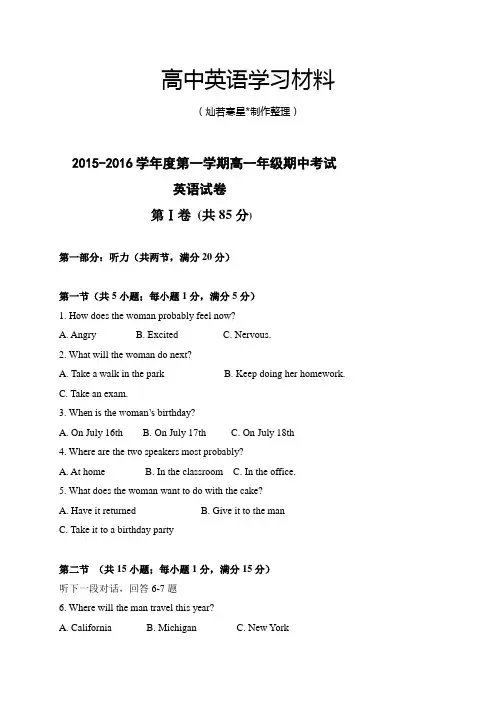
高中英语学习材料(灿若寒星*制作整理)2015-2016学年度第一学期高一年级期中考试英语试卷第Ⅰ卷(共85分)第一部分:听力(共两节,满分20分)第一节(共5小题;每小题1分,满分5分)1. How does the woman probably feel now?A. AngryB. ExcitedC. Nervous.2. What will the woman do next?A. Take a walk in the parkB. Keep doing her homework.C. Take an exam.3. When is the woman’s birthday?A. On July 16thB. On July 17thC. On July 18th4. Where are the two speakers most probably?A. At homeB. In the classroomC. In the office.5. What does the woman want to do with the cake?A. Have it returnedB. Give it to the manC. Take it to a birthday party第二节(共15小题;每小题1分,满分15分)听下一段对话,回答6-7题6. Where will the man travel this year?A. CaliforniaB. MichiganC. New York7. What is the woman’s plan for the summer?A. To go campingB. To visit friendsC. To relax at home听下一段对话,回答8-9题8.What will the woman do tomorrow?A. Work on her school paperB. Go to a movieC. Visit her grandma9. When will the man probably spend time with her friend?A. From 6:00 to 6:30B. From 6:30 to 7:00C. From 7:00 to 7:30听下一段对话,回答10-12题10. Why did the woman give up playing ping-pong?A. She found it difficultB. She loved basketball betterC. She had no time to practice11. How often does the man usually play ping-pong?A. Three times a weekB. Twice a weekC. Once a week12. What does the woman like to do on Wednesday?A. Practice yogaB. Play volleyballC. Play tennis听下一段对话,回答13-16题13. What are two speakers mainly talk about?A. A swimming competitionB. A singing contestC. A travel plan14. What does the woman say about her group?A. They have won for the past three years.B. They beat the same group two yearsC. They came in second place this year.15. How did the man spend his weekend?A. By studying in the libraryB. By waling on the beachC. By swimming in the ocean16. What will the woman and her group probably do when the semester is over?A. Add new membersB. Organize a graduation partyC. Take a trip to the beach.听下一段对话,回答17-20题17. With whom did the speaker visit Italy this time?A. His cousins Eve and AnnB. Two of his close friendsC. His father18.Which city did the speaker visit on the first day?A. FlorenceB. RomeC. Umbria19. What did the speaker do in Sicily?A. He went to the beachB. He toured some old villages.C. He visited several museums.20. How long did the speaker travel around Italy this time?A. Three daysB. Four daysC. Five days.第二部分:英语知识运用(共两节,满分35分)第一节:单项填空(共15小题,每小题1分,满分15分)21. Many people realize that they should go on ____ balanced diet and make ___ most of their spare time to exercise.A. a; /B. the; aC. the; theD. a ; the22. Her father will never _______ of her going to study in the USA.A. proveB. agreeC. argueD. approve.23. The children were left ________ of a neighbor when they were on holiday.A. in chargeB. in the chargeC. under chargeD. at charge.24. Only by hard working can you _______ the goal.A. achieveB. receiveC. makeD. take25. Our English teacher has _________in teaching.A. many experienceB. much experienceC. much experiencesD. few experience26. He regretted __________ in the exam because he was punished.A. to cheat B cheating C cheated D being cheated27. ________ you have got the chance, you might as well make use of it.A. Now thatB. WhenC. WhileD. That.28. We had wanted to finish our task by noon, but it didn’t quite ______as planned .A. find outB. give outC. hand outD. work out.29. The man insisted ______ a taxi for me even though I told him I lived nearby.A. findB. to findC. on findingD. in finding30. I suggested a doctor ________ at once.A. must be sentB. be sent forC. to send forD. sending for31. Do you know the reason _____ he didn’t come?A. thatB. whichC. forD. why32. Mr Smith is the teacher ___ house caught fire last week.A. hisB. whichC. whoseD. whom33. The book, the cover_____ is broken, is not mine.A. of itB. for whichC. of whomD. of which34. Those _____ with me raise your hand.A. who agreeB. who agreesC .that agree D. whom agrees35. This is the very shop ______ sells children’s clothes.A. whereB. /C. thatD. which第二节:完形填空(共20小题;每小题1分,满分20分)Mr. Thomas had always wanted to make a trip into the middle of Africa to shoot wild animals. 36___first he had not had enough money, and 37___he had married. His wife had not wanted him to 38___her. At last his wife 39___to the trip if he allowed her to go, 40____.“But it will be very uncomfortable,” Mr. Thomas warned her. “It will be very 41___ and we shall live in a tent, and it 42___ be dangerous. ”“I don’t 43___.” said his wife. “I want to go with you.” So they bought a big tent, campbeds, and a refrigerator, which did not need 44____ and many other things, which would make the trip comfortable, and went off to the45____ of Africa.The first morning, before Mr. Thomas took his gun and left the tent, he 46___his wife a bell and explained to her, “If you feel in 47____and you need me, 48____this bell and I’ll come at once. ”After a few minutes, he heard the bell and returned 49___to the tent. “What’s the matter?” he asked. “50____”, said his wife, “I was only trying the bell. ”Mr. Thomas went off, but after a quarter of an hour, the bell rang 51___. Mr. Thomas hurried back to the tent, but his wife said, “I’m 52___. I want cleaning our tent, and I knocked the bell by mistake.Mr. Thomas returned to his hunting, but soon he heard the 53____ once more, This time, when he got back to his 54____, the tent was burning and Mrs. Thomas was lying on the ground, with 55____running from a big cut on her shoulder. “That’s better!” said Mr. Thomas. “This time the bell had been used correctly!”36.A. And B. But C. For D. So37.A. before B. so C. then D. when38.A. leave B. miss C. marry D. care39.A. allowed B. permitted C. satisfied D. agreed40.A. too B. down C. up D. either41.A. cold B. cool C. warm D. hot42.A. may B. ought C. can't D. shall43.A. want B. like C. care D. remember44.A. money B. electricity C. force D. power45.A. south B. middle C. east D. west46.A. gave B. sent C. lent D. bought47.A. hurry B. surprise C. safety D. danger48.A. hit B. knock C. beat D. ring49.A. again B. back C. quickly D. home50.A. Something B. Nothing C. No D. None51.A. again B. once C. across D. away52.A. happy B. sorry C. tired D. all right53.A. cry B. shot C. bell D. shout54.A. garden B. house C. camp D. office55.A. water B. tears C. blood D. sweat第三部分:阅读理解(共15小题;每小题2分,满分30分AWhen you are feeling unhappy or forget how great you are, these are six ways to make you feel good about yourself.1) Look in the mirror and say to yourself, "I am a special person and there's no one in the world like me. I can do anything!" It may not sound so good, but it really works!2) Do something nice for someone. Helping others always makes you feel good.3) Smile! Be friendly to people you meet. Look for the good things in your friends and family.4) Learn something new! Have you always wanted to decorate your own room or learn how to swim? Go for it! New challenges are fun and give you a sense of accomplishment when you have finished.5) Read and start a diary. Turn off the TV and let your imagination fly! Write down your thoughts, dreams or anything you want! Writing always helps to express your feelings.6) Stay with your family. We all need our family time. Talk with your Mum or Dad or maybe even your cousin.56. This passage may be taken from __________.A. a science bookB. a story bookC. a magazineD. school rules57. What do the underlined words in 4)' "a sense of accomplishment" mean?A.成就感B.忧伤感C.挫折感D.信任感58. Which of the following should you say "NO" to when you are unhappy?A. You should always look for the good things of others.B. Stay alone at home as much as possible.C. Learn something new and go for it!D. Keep a diary to express your feelings.BA student is learning to speak British English. He wonders: Can I communicate (交际) with Americans? Can they understand me? Learners of English often ask: What are the differences between British and American English? How important are these differences?Certainly, there are some differences between British and American English. There are a few differences in grammar. For example, s peakers of British English say “in hospital” and “Have you a pen?”. Americans say “in the hospital” and “Do you have a pen?”. Pronunciation is sometimes different. Americans usually sound theirs in words like “bird” and “hurt”. Speakers of British English do not sound theirs in these words. There are differences between British and American English in spelling and vocabulary. For example, “color” and “honor” are British, “color” and “honor” are American.These differences in grammar, pronunciation, spelling and vocabulary are not important, however. For the most part, British and American English are the same language.59. According to this passage, a student who is learning to speak American English might be afraid that ______.A. British people cannot understand himB. American people cannot understand himC. the grammar is too hard for himD. the spelling is too hard for him60. American English and British English are different in __________.A. spellingB. pronunciationC. grammarD. all of the above61. What is NOT mentioned(提及) in the passage?A. Whether there are differences between British English and American English.B. Whether British English and American English are one language or two.C. How the differences between British English and American English came about.D. How important the differences are.62、Most ________ say “Do you have a watch?”A. British peopleB. AmericansC. childrenD. teachers63. According to this passage, British people and Americans have ______ difficulty in understanding each other.A. littleB. muchC. someD. greatCWelcome to Adventure land!Everyone loves Adventure land! The Parks and Exhibitions were built for you to explore (探索), enjoy, and admire their wonders. Every visit will be an unforgettable experience. You will go away enriched, longing to come back. What are you going to do this time?The Travel PavilionExplore places you have never been to before, and experience different ways of life.Visit the Amazon jungle (丛林) village, the Turkish market, the Tai floating market, the Berber mountain house and others. Talk to the people there who will tell you about their lives, and things they make. You can try making a carpet, making nets, fishing…The Future TowerThis exhibition shows how progress will touch our lives. It allows us to look into the future and explore the cities of the next century and the way we’ll be living then. Spend some time in our space station and climb into our simulator for the Journey to Mars!The Nature ParkThis is not really one park but several.In the Safari Park you can drive among African animals in one of our Range Cruisers: see lions, giraffes, elephants in the wild. Move on to the Ocean Park to watch the dolphins and whales. And then there is still the Aviary to see…The PyramidThis is the center of Adventure land. Run out of film, need some postcards and stamps? For all these things and many more, visit our underground shopping centre. Come here for information and ideas too.64. The Travel Pavilion is built to help visitors ________.A. learn something about different places in the worldB. become familiar with mountain countriesC. learn how to make things such as fishing netsD. realize the importance of traveling65. If you are interested in knowing about what people’s life will be, you may visit ________.A. the Travel PavilionB. the Safari ParkC. the Future TowerD. the Pyramid66. If you want to get a toy lion to take home, where will you most likely go?A. The Nature Park.B. The Pyramid.C. The Future Tower.D. The Travel Pavilion.DA car drew up outside the Swan Hotel and a young man got out.Pausing only for an instant to see that he had come to the right place,he went into the hotel and rang the bell on the counter of the bar.Mrs. Crump,the landlady,who was busy in the kitchen at the time,hurried out,wiping her hands.The young man raised his hat.“Excuse me,”he said.“I’m looking for my uncle,Mr. White.I believe he is staying here.”“He was staying here.”Mrs. Crump corrected him.“But I’m afraid that he went back to London yesterday.”“Oh,dear,”said the young man,looking disappointed.“I understood that he was going to stay here until the end of the month.At least that is what his servant told me when I rang up his house.”“Quite right,”said Mrs. Cramp.“He intended to stay here the whole of July,as he always does.But yesterday he got a telegram to say that his relative was ill.So he caught the train back to London immediately.”“I wish he had let me know,” The young man said.“I wrote him a letter saying that I was coming.I’v e had all this trouble for nothing.Well,since he isn’t here,there’s no point in waiting.”He thanked Mrs. Grump and went out.Mrs. Grump went to the window and watched him drive off.When his car was out of sight,she called out:“You can come out now, Mr. White. He’s gone.”Mr. White came out of the kitchen,where he had been waiting.“Many thanks,Mrs. Grump,”he said,laughing,“you did that very well.These nephews of mine never gave me any peace.That young man is the worst of them all.As you see,when he needs money, he even follows me into the country.Well,perhaps next time he won’t warn me by writing a letter!”67. The young man said “Oh,dear” to express his ______.A. disappointmentB. sadnessC. surpriseD. anger68. This story is about a man ______.A. who was very much loved by his nephewsB. whose nephew went to visit him at the hotelC. whose nephew is always asking him for helpD. who was not willing to meet his nephew69. When his nephew came to the hotel, Mr.White ____.A. took the train back to LondonB. left to visit a sick relativeC. went to pick up a telegramD. hid himself in the kitchen70. Mr. White didn’t like his nephews because ______.A. they always follow him aroundB. they frequently disturb their relativesC. they won’t write to him oftenD. they usually visit him in hotels第Ⅱ卷(共35分)第一节:任务型阅读(共10小题;每小题1分,满分10分)请认真阅读下列短文,并根据所读内容在文章后表格里填入最恰当的单词。
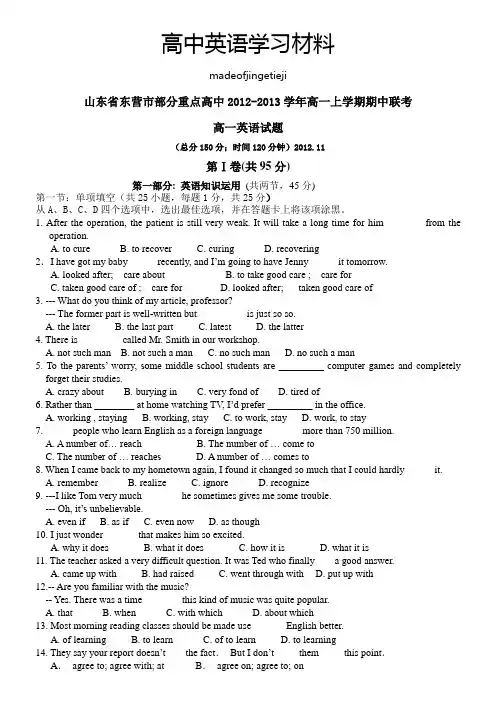
高中英语学习材料madeofjingetieji山东省东营市部分重点高中2012-2013学年高一上学期期中联考高一英语试题(总分150分;时间120分钟)2012.11第Ⅰ卷(共95分)第一部分: 英语知识运用(共两节,45分)第一节:单项填空(共25小题,每题1分,共25分)从A、B、C、D四个选项中,选出最佳选项,并在答题卡上将该项涂黑。
1. After the operation, the patient is still very weak. It will take a long time for him _______ from theoperation.A. to cureB. to recoverC. curingD. recovering2.I have got my baby _____ recently, and I’m going to have Jenny _____ it tomorrow.A. looked after; care aboutB. to take good care ; care forC. taken good care of ; care forD. looked after; taken good care of3. --- What do you think of my article, professor?--- The former part is well-written but _________ is just so so.A. the laterB. the last partC. latestD. the latter4. There is ________ called Mr. Smith in our workshop.A. not such manB. not such a manC. no such manD. no such a man5. To the parents’ worry, some middle school students are _________ computer ga mes and completely forget their studies.A. crazy aboutB. burying inC. very fond ofD. tired of6. Rather than ________ at home watching TV, I’d prefer _________ in the office.A. working , stayingB. working, stayC. to work, stayD. work, to stay7. _____ people who learn English as a foreign language _______ more than 750 million.A. A number of… reachB. The number of … come toC. The number of … reachesD. A number of … comes to8. When I came back to my hometown again, I found it changed so much that I could hardly _____ it.A. rememberB. realizeC. ignoreD. recognize9. ---I like Tom very much _______ he sometimes gives me some trouble.--- Oh, it’s unbelievable.A. even ifB. as ifC. even nowD. as though10. I just wonder ______ that makes him so excited.A. why it doesB. what it doesC. how it isD. what it is11. The teacher asked a very difficult question. It was Ted who finally ___ a good answer.A. came up withB. had raisedC. went through withD. put up with12.-- Are you familiar with the music?-- Yes. There was a time _______ this kind of music was quite popular.A. thatB. whenC. with whichD. about which13. Most morning reading classes should be made use ______ English better.A. of learningB. to learnC. of to learnD. to learning14. They say your report doesn’t ___ the fact.But I don’t ____ them ____ this point.A.agree to; agree with; at B.agree on; agree to; onC.agree on; agree on; on D.agree with; agree with; on15 ---"How do you like the book?"--- "It's quite different from ______ I read last month."A.that B.which C.the one D.the one what16. The pleasant weather ____ our pleasure. We had a wonderful time in Europe..A. added toB. addedC. added up toD. added up17.Hurry up! The train _______. You know, it _______ at 8: 30 am.A. leaves; leavesB. is leaving; leavesC. leaves; is leavingD. is leaving; is leaving18. It is the first time that we ____ a film in the cinema together as a family.A. seeB. had seenC. have seenD. saw19. I think it was on the playground on ______ we played basketball with some boys yesterday ______you lost your handbag.A. where; thatB. which; thatC. on which; whenD. which; when20. You really don’t know what great difficulties we _______ these years while working on the project.A. went throughB. have gone alongC. have gone throughD. had suffered21. ---Don’t be upset; it won’t be long ______ we meet again.--- But, actually, it will be six days _____ I can see you. That’s why I have been sad these days.A. when; beforeB. until; whenC. before; beforeD. until; before22. His sister left home in 1998, and ____ ever since.A. has not heard fromB. has not been heard ofC. had not heard fromD. had not been heard of23. I couldn’t do my hom ework with all that noise ________ .A. going onB. goes onC. went onD. to go on24. The little boy felt grateful ____ the coach for his letting him ____ the game.A. for; join inB. to; to join inC. with; joinD. to; join in25. ---Have a picnic this weekend?--- ___________. I’d like to go out for a rest.A. I couldn’t agree moreB. I’m afraid notC. I believe notD. I don’t think so第二节完型填空(共20小题;每小题1分,满分20分)阅读下面短文,从短文后各题的A、B、C、D四个选项中,选出适合填入对应空白处的最佳选项,并在答题卡上将该选项涂黑。
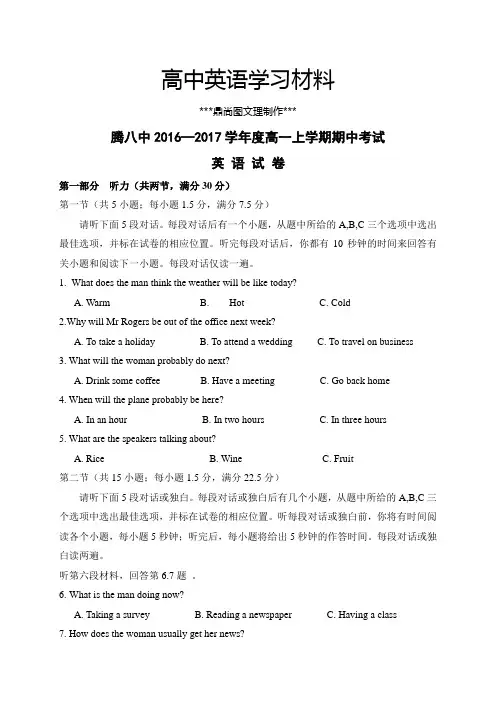
高中英语学习材料***鼎尚图文理制作***腾八中2016—2017学年度高一上学期期中考试英语试卷第一部分听力(共两节,满分30分)第一节(共5小题;每小题1.5分,满分7.5分)请听下面5段对话。
每段对话后有一个小题,从题中所给的A,B,C三个选项中选出最佳选项,并标在试卷的相应位置。
听完每段对话后,你都有10秒钟的时间来回答有关小题和阅读下一小题。
每段对话仅读一遍。
1. What does the man think the weather will be like today?A. WarmB. HotC. Cold2.Why will Mr Rogers be out of the office next week?A. To take a holidayB. To attend a weddingC. To travel on business3. What will the woman probably do next?A. Drink some coffeeB. Have a meetingC. Go back home4. When will the plane probably be here?A. In an hourB. In two hoursC. In three hours5. What are the speakers talking about?A. RiceB. WineC. Fruit第二节(共15小题;每小题1.5分,满分22.5分)请听下面5段对话或独白。
每段对话或独白后有几个小题,从题中所给的A,B,C三个选项中选出最佳选项,并标在试卷的相应位置。
听每段对话或独白前,你将有时间阅读各个小题,每小题5秒钟;听完后,每小题将给出5秒钟的作答时间。
每段对话或独白读两遍。
听第六段材料,回答第6.7题。
6.What is the man doing now?A. Taking a surveyB. Reading a newspaperC. Having a class7. How does the woman usually get her news?A. Form TVB. From newspapersC. From the Internet 听第七段材料, 回答第8至10题.8.What does the woman want to do at first?A. Exchange the glovesB. Return the glovesC. Try on the gloves9. How much will the woman pay in the end?A. Four dollarsB. Twenty-five dollarsC. Twenty-nine dollars 听第八段材料,回答第11至13 题.10.Who will look after Snow?A. JenniferB. EvaC. Charles11. Why can’t James look after Snow?A. He has fallen ill.B. He will go to ParisC. He will go to the beach12.What day is it today?A. TuesdayB. WednesdayC. Thursday听第九段材料,回答第13至16题.13. How many kilos of tomatoes will the man buy?A. Half a kiloB. A kiloC. Two kilos14. What does the woman need to buy for the children’s lunches?A. CarrotsB. JuiceC.Apples15. Which of the following won’t the man buy ?A. PotatoesB. ChocolateC. Beer16. Where is the woman now probably?A. At homeB. In the supermarketC. In the office听第十段材料,回答第18至20题.17.What does the speaker’s father do?A. A shop keeperB. A postmanC. A nurse18. How many sisters does the speaker’s dad have ?A. TwoB. ThreeC. Four19. Where is Uncle Sean now?A. In the StatesB. In IcelandC. In England20 . What do we know about Uncle Sean ?A. He is in his twentiesB. He lives in the villageC. He studies business at university第二部分阅读理解(共20小题;每小题2分,满分40分)第一节:.阅读下列短文,从每题所给的四个选项(A、B、C和D)中,选出最佳选项,并在答题卡上将该项AIn the world ,soccer of football is the most popular sport. This is because many countries have wonderful teams for the World Cup. The World Cup is held every four years. To remember 2002 FIFA World Cup ,children from different countries and more than 60 children from Japanese schools came together and spent three weekends drawing a big picture called “Dream(梦幻) World Cups ”in Japan .The children drew animals, flowers and people playing soccer under a blue bright sky. They wished each football team good luck by drawing the flags(旗帜)of all the countries that will take part in the World Cup in Japan and South Korea.The picture was put up in a park near a playground in Yokohama .Some football teams will have games there.Are you a football fan(迷)?The World Cup makes more and more people interested in football Teenagers(青少年)like playing and watching football .Many of them love some football stars so much that they get the pictures of their favourite players on the walls of their rooms. That is the way to show their love for the World Cup as children in Japan.21. If a country wants to take part in the World Cup ,she must have______.A. Many football fansB. a very good teamC. many football playerD. a big playground22. The next World Cup will be held in_______.A. 2006B. 2007C. 2005D. 200423. From the passage ,in the picture children drew many things except_________.A. people playing footballB. pictures of some football starsC. a sunny skyD. flowers24. Many teenagers owe the pictures of some football stars because______.A. they are interested in footballB. they are football fansC. they think their favourite players are greatD. all of A,B and CBFriends are very important in people’s life. No one can live alone in the world without friends. I think it’s easy to make friends with people and build a friendship between each other. However, I think it is not easy to get a true friendship.So what is true friendship? In my opinion, a true friendship includes four aspects(方面).First of all , a true friendship requires people to treat their friends truthfully and believe each other. In other words, you must not take advantage of your friends nor try to cheat them. For example, some people make friends in order to get money and emotion, or obtain(获取) a certain secret and so on. I think these are not true friendships.Second, true friends must try their best to help each other. For instance , a true friend will use personal connections to help a friend get something hard to obtain such as a job, an appointment with a good doctor, an easier path through an official procedure(步骤) or an introduction to another person who might also be able to give help. If a friend is indeed in need of money to escape from some trouble or buy some necessary things, true friends might give him money and help him out financially over a long period of time.Thirdly, friends must share their happiness and sadness as well. One of the greatest men once said, “If you tell your happin ess to your friend, you will get double happiness. If you tell your sadness to your friends. You will get half sadness.” It is true. A true friend will give you comfort and emotional support when you are sad.Fourth, a true friendship is a relationship that endures (经得起) changes in the lives of the friends. People expect their friendship to stay the same over a long period of time maybe for a lifetime, no matter where they are.In a word, a true friendship must depend on people to believe each other , help each other, and share their happiness and sadness with each other.25. According to the writer, .A. it is not easy to make friendsB. when one is friendly to you, he will be your friendC. true friends are hard to findD. a friend can help you with everything26. From this text, we know that .A. money plays the key role in making friendsB. a true friend must last for a lifetimeC. friends cannot depend on each other on money matters.D. friends should help each other out of troubles.27. The title of this text is probably “”.A. Be Careful with Making Friends!B. Cheat! Cheat! Another Cheat!C. Money or Friend?D. True FriendshipCThis March is a busy month in Shanghai. There's a lot to do. Here are the highlights.Live Music - Late Night JazzEnjoy real American jazz from Herbie Davis, the famous trumpet player. He's coming with his new 7-piece band, Herbie' s Heroes. Herbie is known to play well into the early hours, so don't expect to get much sleep. This is Herbie' s third visit to Shanghai. The first two were sold out, so get your tickets quickly.PLACE: The Jazz Club DATES: 15-23 March PRICE: ¥80,120 TIME:10:00p.m. till late! TEL: 6466-8736Scottish dancingTake your partners and get ready to dance till you drop. Scottish dancing is fun and easy to learn. Instructors will demonstrate the dances. The live band, Gordon Stroppie and the Weefrees, are also excellent.PLACE: Jack Stein's DATES: every Monday PRICE: Y60including one drink TIME: 7:00 - ~0:00 p.m. TEL: 6402-1877Exhibitions - Shanghai MuseumThere are 120,000 pieces on show here. You can see the whole of Chinese history under one roof. It' s always interesting to visit, but doubly so at the moment with the Egyptian Tombs exhibition. There are lots of mummies and more gold than you've ever seen before. Let us know if you see a mummy move!PLACE: Shanghai Museum PRICE: ¥30 (¥15 for students) TEL:6888-6888 DATES: daily TIME: Monday - Friday 9:00a.m. - 5:00p.m.,Weekends 9:00a.m. - 9:00p.m.Dining - Sushi chef in townSushi is getting really big in Shanghai. In Japan, it' s become an art form. The most famous Sushi 'artist' is Yuki Kamura. She' s also one of the few female chefs in Japan. She' ll be at Sushi Scene all of this month.PLACE: Sushi Scene in the Shanghai Hotel DATES: all month PRICE:¥200 TIME: lunchtime TEL: 6690-3211For a full listing of events, see our website.28.Suppose you are going to attend an activity at 8: 00p. m. on Saturday, which one can youchoose?A. Live Music - Late Night JazzB. Scottish dancingC. Exhibitions - Shanghai MuseumD. Dining - Sushi chef in town29.Which of the following is true according to the advertisements?A. Scottish dancing is so interesting and easy that it never tires you out.B. The performance given by the American jazz band won't last long.C. Sushi is not popular in Shanghai as it is a kind of Japanese traditional food.D. It is more interesting to visit Shanghai Museum for the exhibits from Egypt.30.From the text we may learn that Kamura is _______.A. a cookB. a waitressC. an instructorD. an artist31. As a student , if you want to see a mummy move, you need to pay -----A.120 yuanB.60 yuanC.30yuanD.15yuanDSurtsey was born in 1963.Scientists saw the birth of this island. It began at 7.30 a.m. on 14th November. A fishing boat was near Iceland. The boat moved under the captain's(船长)feet. He noticed a strange smell. He saw some black smoke. A volcano(火山)was breaking out. Red-hot rocks, fire and smoke were rushing up from the bottom(底部)of the sea. The island grew quickly. It was 10 meters high the next day and 60 meters high on 18th November. Scientists flew there to watch. It was exciting. Smoke and fire were still rushing up. Pieces of red-hot rock were flying into the air and falling into the sea. The sea was boiling and there was a strange light in the sky. Surtsey grew and grew. Then it stopped in June 1967.It was 175 meters high and 2 kilometers long. And life was already coming to Surtsey. Plants grew. Birds came. Some scientists built a house. They wantto learn about this young island. A new island is like a new world.32. Surtsey is ______.A. an island not far from IcelandB. a new volcanoC. a fishing boatD. a place in Iceland33. Scientists flew there ______.A. to watch the birth of the islandB. to save the fishing boatC. to learn about the islandD. to build a house34. When did scientist fly there to watch?A. Before the volcano broke outB. As soon as the volcano broke out.C. About four days after the volcano broke out.D. After the volcano stopped rushing up.35. The best title of this article is ________.A. A new islandB. The birth of an islandC. A new worldD. Scientists discovered Surtsey第二节:第二节(共5小题;每小题2分,满分10分)根据短文内容,从短文后的选项中选出能填入空白处的最佳选项。
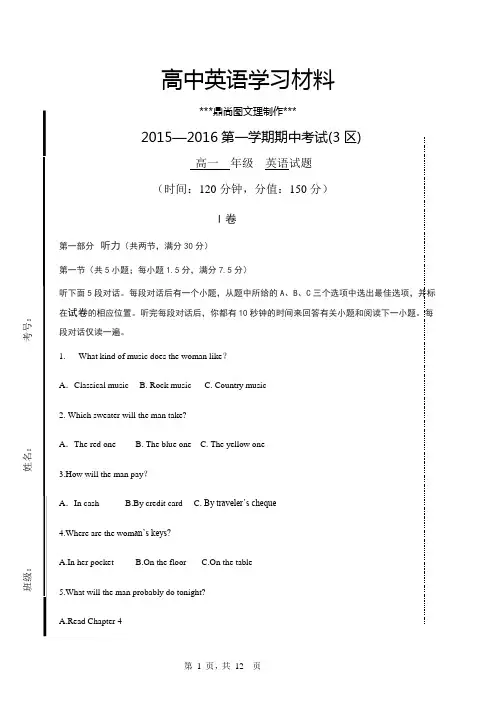
高中英语学习材料***鼎尚图文理制作*** 2015—2016第一学期期中考试(3区)高一 年级 英语试题(时间:120分钟,分值:150分) I 卷 第一部分 听力(共两节,满分30分) 第一节(共5小题;每小题1.5分,满分7.5分) 听下面5段对话。
每段对话后有一个小题,从题中所给的A 、B 、C 三个选项中选出最佳选项,并标在试卷的相应位置。
听完每段对话后,你都有10秒钟的时间来回答有关小题和阅读下一小题。
每段对话仅读一遍。
1. What kind of music does the woman like ? A .Classical music B. Rock music C. Country music 2. Which sweater will the man take? A .The red one B. The blue one C. The yellow one 3.How will the man pay ? A .In cash B.By credit card C. By traveler’s cheque 4.Where are the wom an’s keys? A.In her pocket B.On the floor C.On the table 5.What will the man probably do tonight?A.Read Chapter 4班级:____________ 姓名:_____________ 考号:________________________ 第 1 页,共 12 页B.Study in the libraryC.Watch the football match第二节(共10小题;每小题1.5分,共15分)听下面4段对话或独白。
每段对话或独白后有几道小题,从每题所给的A、B、C三个选项中选出最佳选项。
听每段对话或独白前,你将有5秒钟的时间阅读每小题。
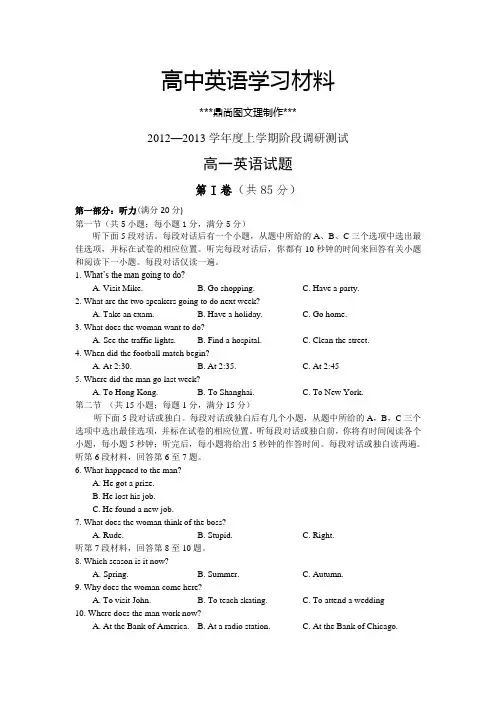
高中英语学习材料***鼎尚图文理制作***2012—2013学年度上学期阶段调研测试高一英语试题第I卷(共85分)第一部分:听力(满分20分)第一节(共5小题;每小题1分,满分5分)听下面5段对话。
每段对话后有一个小题,从题中所给的A、B、C三个选项中选出最佳选项,并标在试卷的相应位置。
听完每段对话后,你都有10秒钟的时间来回答有关小题和阅读下一小题。
每段对话仅读一遍。
1. What’s the man going to do?A. Visit Mike.B. Go shopping.C. Have a party.2. What are the two speakers going to do next week?A. Take an exam.B. Have a holiday.C. Go home.3. What does the woman want to do?A. See the traffic lights.B. Find a hospital.C. Clean the street.4. When did the football match begin?A. At 2:30.B. At 2:35.C. At 2:455. Where did the man go last week?A. To Hong Kong.B. To Shanghai.C. To New York.第二节(共15小题;每题1分,满分15分)听下面5段对话或独白。
每段对话或独白后有几个小题,从题中所给的A,B,C三个选项中选出最佳选项,并标在试卷的相应位置。
听每段对话或独白前,你将有时间阅读各个小题,每小题5秒钟;听完后,每小题将给出5秒钟的作答时间。
每段对话或独白读两遍。
听第6段材料,回答第6至7题。
6. What happened to the man?A. He got a prize.B. He lost his job.C. He found a new job.7. What does the woman think of the boss?A. Rude.B. Stupid.C. Right.听第7段材料,回答第8至10题。
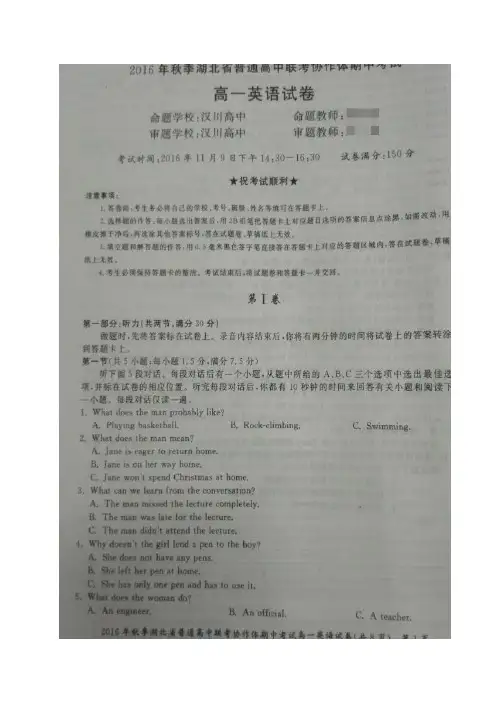
2016年秋季湖北省普通高中联考协作体期中考试高一英语试答案听力1-5 CABCB 6-10 CABCA 11-15 CABAB 16-20 CCBAB阅读理解21-24 CDBC 25-28 DCAB 29-32 BDAD 33-35 BCAA篇:应用文。
介绍了几款教学软件。
21 C 细节理解题。
根据第一段which lets kids share artwork on Twitter safely and easily.可知。
22 D 细节理解题。
根据第二段Kids can tap and practice their letters. The game can also becustomized (定制) by teachers and parents可知。
23 B 推理判断题。
根据第三段This app enables PE teachers to view and measure their students’performance during the class.可推断出。
24 C 推理判断题。
根据第四段Earth Viewer is like a time machine for exploring the historyof the earth可推断出。
B篇:记叙文。
本文讲述了作者童年时期赌气离家出走的一段囧事。
25 D 推理判断题。
根据文中妈妈对作者几次故意为难的对话以及倒数第二段The door opened andMom’s smiling face appeared.的描述可知,作者的母亲对孩子既严格又充满关爱。
26 C 细节理解题。
根据第8段I tore my clothes off --- shoes, socks, underwear and all ---and shouted, “Can I go now?”的描述可知,作者对妈妈提出的要求感到非常惊讶生气。
27 A 细节理解题。
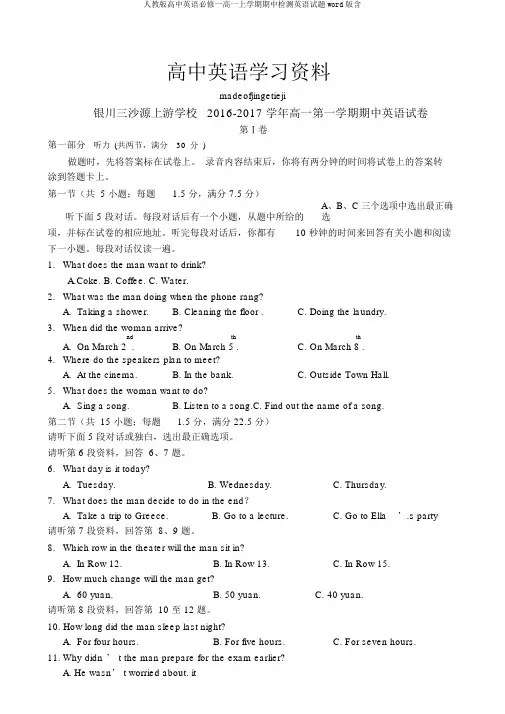
人教版高中英语必修一高一上学期期中检测英语试题word版含高中英语学习资料madeofjingetieji银川三沙源上游学校2016-2017 学年高一第一学期期中英语试卷第Ⅰ卷第一部分听力(共两节,满分30分)做题时,先将答案标在试卷上。
录音内容结束后,你将有两分钟的时间将试卷上的答案转涂到答题卡上。
第一节(共 5 小题;每题 1.5 分,满分 7.5 分)听下面 5 段对话。
每段对话后有一个小题,从题中所给的A、B、C 三个选项中选出最正确选项,并标在试卷的相应地址。
听完每段对话后,你都有10 秒钟的时间来回答有关小题和阅读下一小题。
每段对话仅读一遍。
1.What does the man want to drink?A.Coke.B. Coffee.C. Water.2.What was the man doing when the phone rang?A. Taking a shower.B. Cleaning the floor .C. Doing the laundry.3.When did the woman arrive?nd th thA. On March 2 .B. On March 5 .C. On March 8 .4.Where do the speakers plan to meet?A. At the cinema.B. In the bank.C. Outside Town Hall.5.What does the woman want to do?A. Sing a song.B. Listen to a song.C. Find out the name of a song.第二节(共 15 小题;每题 1.5 分,满分 22.5 分)请听下面 5 段对话或独白,选出最正确选项。
请听第 6 段资料,回答 6、7 题。
6.What day is it today?A. Tuesday.B. Wednesday.C. Thursday.7.What does the man decide to do in the end?A. Take a trip to Greece.B. Go to a lecture.C. Go to Ella ’.s party请听第 7 段资料,回答第 8、9 题。
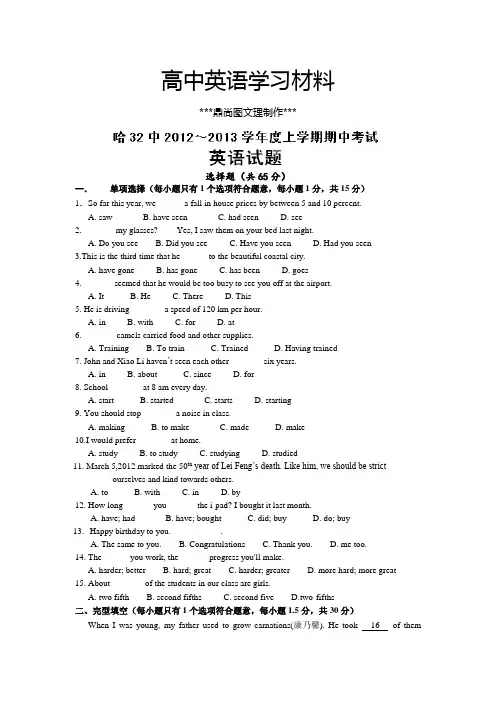
高中英语学习材料***鼎尚图文理制作***选择题(共65分)一.单项选择(每小题只有1个选项符合题意,每小题1分,共15分)1.So far this year, we ______a fall in house prices by between 5 and 10 percent.A. sawB. have seenC. had seenD. see2.--______ my glasses? --Yes, I saw them on your bed last night.A. Do you seeB. Did you seeC. Have you seenD. Had you seen3.This is the third time that he ______to the beautiful coastal city.A. have goneB. has goneC. has beenD. goes4._______ seemed that he would be too busy to see you off at the airport.A. ItB. HeC. ThereD. This5. He is driving _______ a speed of 120 km per hour.A. inB. withC. forD. at6.______ camels carried food and other supplies.A. TrainingB. To trainC. TrainedD. Having trained7. John and Xiao Li haven’t seen each other _______ six years.A. inB. aboutC. sinceD. for8. School _______ at 8 am every day.A. startB. startedC. startsD. starting9. You should stop _______ a noise in class.A. makingB. to makeC. madeD. make10.I would prefer _______ at home.A. studyB. to studyC. studyingD. studied11. March 5,2012 marked the 50th year of Lei Feng’s death. Like him, we should be strict______ourselves and kind towards others.A. toB. withC. inD. by12. How long ______ you ______ the i-pad? I bought it last month.A. have; hadB. have; boughtC. did; buyD. do; buy13.--Happy birthday to you. --________.A. The same to you.B. CongratulationsC. Thank you.D. me too.14. The ______you work, the ______ progress you'll make.A. harder; betterB. hard; greatC. harder; greaterD. more hard; more great15. About _______ of the students in our class are girls.A. two fifthB. second fifthsC. second fiveD.two-fifths二、完型填空(每小题只有1个选项符合题意,每小题1.5分,共30分)When I was young, my father used to grow carnations(康乃馨). He took 16 of themwith 17 much love and care. 18 everyone 19 saw them 20 for their beauty. Every day he came from work, he went 21 to see them. He enjoyed 22 them and 23 did we kids. 24 he was always telling us, "No one should touch my flowers."One day my elder sister who had wanted to help him 25 the carnations from their stems(枝干) one by one and put them on the floor deliberately(精心的). She believed that he would be 26 to see them that way.That day 27 my father arrived, he went straight to see the flowers 28 . When he saw his flowers 29 there like dead animals, he was shocked at first. He looked towards the street to see if it was 30 children who could have done it. He was upset watching the flowers. Everybody stood and kept silent. We didn't know 31 to do with it. 32 my mother began gently, "We have no bad neighbours in this area. Only your daughter Susan. She just wanted 33 you make the flowers please you in another way. Then there was a smile on my dad's face. "Do I have a better 34 than my daughter? My elder sister smiled and hugged dad tightly. Parents can always forgive any mistake we've made 35 love and understanding. ( )16.A. careful B. carefully C. care( )17.A. very B. so C. such( )18.A. And B. But C. Or( )19. A. whom B. who C. when( )20. A. cared B. admired C. shared( )21. A. straight B. soon C. immediately( )22. A. to watch B. watch C. watching( )23.A. so B. such C. nor( )24.A. So B. Then C. But( )25.A. watered B. cut C. planted( )26.A. surprised B. worried C. pleased( )27.A. when B. before C. if( )28.A. as usual B. at once C. as well( )29.A. standing B. destroyed C. lying( )30.A. friends' B. families' C. neighbours'( )31.A. what B. how C. why( )32.A. Therefore B. Finally C. However( )33.A. help B. helping C. to help( )34.A. hug B. kiss C. caught( )35.A. since B. because C. because of三、阅读理解(每小题只有1个选项符合题意,每小题2分,共20分)AYou probably know that traffic in Beijing is crazy. Sometimes the cars can hardly move for a long time. The terr ible traffic is caused by poor road and the government’s ability to deal with so many cars on the road at the same time.With more Chinese people buying cars every day, the problem seems to only be getting worse. But a design company called Shenzhen Hashi Future Parking Equipment has a possible solution: the super bus.The super bus will carry up to 1,400 people. It’ll travel on a rail system that will be raised above the roads, so cars can drive under it. The bus will run on electricity and solar power, creating far less pollution than that from the cars.Beijing authorities(当局) haven’t decided whether to create railway for the super bus all over the city. But they are willing to give it a test the super bus with passengers.According to the government, Beijing might have had five million cars on the road by the end of 2010. So it seems to be necessary to start taking the super bus instead soon.( )36. What cause the terrible traffic in Beijing?A. The busesB. The roadsC. The polution( )37. What is Shenzhen Hashi Future Parking Equipment?A. A design companyB.A super busC.A kind of equipment( )38. Which of the following is TRUE about the super bus?A. It’ll produce more pollution.B. It’ll run only on electricity.C. It’ll travel above the roads.( )39. The fourth paragraph mainly talks about_______.A. the problems of the super busB. the test drive of the super busC. the reasons of the terrible traffic( )40. The passage mainly talks about ______ in Beijing.A.the trafficB. the driversC.the roadBThe cost of medical care in the United States is very high. The time or money that doctors spend on their medical education is probably one reason for this problem.A visit to doctor’s office costs from fifteen to fifty dollars. For some people it is impossible to pay for the medical care they need. Many people in the United States think that doctors are over-paid. Most doctors however, disagree. They say that they are required to study medicine for a long time. Tuition for many years of medical education costs a lot of money. Doctors say that it is necessary for most medical students to borrow money from a bank to pay their tuition(学费). Because this money must be repaid to the bank, young doctors need a lot of money for their work. So, they charge people high prices for medical care.Therefore, it is possible that the high cost of medical care in America is unnecessary. Because high tuition is one cause of high costs, one way to lower costs would be to have medical schools that are free or have low cost tuition.( )41. Some people do not have their medical care they need because_______.A. they don’t want to spend much money on it.B. they don’t thinks it necess ary to have medical careC. they have n’t got enough money to pay for it( )42. The reason for the high medical cost mentioned in the article is that________.A. tuition in medical schools is highB. the price of medicine is highC. doctors must pay money to banks( )43. One way to lower the cost of medical care would be ________.A. not to see a doctorB. to pay doctors less moneyC. to let medical students have free or partly free medical education( )44. The main idea of the article is that______.A. a visit to a doctor’s office may cost as much as $15to $50 in USAB. the high cost of tuition in medical schools is one reason for the high cost of medicalcareC. medical care in USA costs a lot of money because doctors want to be rich( )45. The cost of medical care in the USA is very high. What does the writer think about it?A. He agrees that doctors are overpaid.B. He thinks it a big problem and suggests a way to settle it.C. He doesn’t think the medical students should borrow money from banks.哈32中2012~2013学年度上学期期中考试英语试题答题卡(考试范围:必修一Module1-4 适用班级:高一普班,体育班)选择题1 2 3 4 5 6 7 8 9 10 11 12 13 14 15 16 17 18 19 20 21 22 23 24 25 26 27 28 29 30 31 32 33 34 35 36 37 38 39 40 41 42 43 44 45非选择题(共35分)四、单词拼写(每小题1分,共10分)1.距离 6.调查2.沙漠7.家乡3.旅程8.买得起4.交换v. 9.打扰5.风景10.职业五、单句改错(每小题1分,共10分)1.After a hour we began to feel frightened.2.The more money you make, the most you spend.3. The milk in the bottle is out of the date.4. In fact, I am very thin when I was young.5. Playing football can make us to grow up tall and strong.6. It's very difficult for a foreigner learn Chinese.7. Most children are interested in listen to music.8. Everyone asked me to go, but I went.9. What time does the train arrive?.10.I am ask her to help me with my study.六、书面表达(共15分)以My Teacher为题写一篇100词左右的短文。
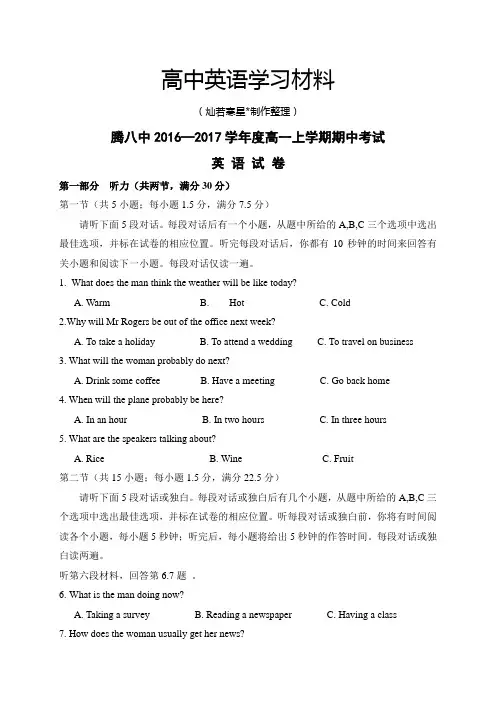
高中英语学习材料(灿若寒星*制作整理)腾八中2016—2017学年度高一上学期期中考试英语试卷第一部分听力(共两节,满分30分)第一节(共5小题;每小题1.5分,满分7.5分)请听下面5段对话。
每段对话后有一个小题,从题中所给的A,B,C三个选项中选出最佳选项,并标在试卷的相应位置。
听完每段对话后,你都有10秒钟的时间来回答有关小题和阅读下一小题。
每段对话仅读一遍。
1. What does the man think the weather will be like today?A. WarmB. HotC. Cold2.Why will Mr Rogers be out of the office next week?A. To take a holidayB. To attend a weddingC. To travel on business3. What will the woman probably do next?A. Drink some coffeeB. Have a meetingC. Go back home4. When will the plane probably be here?A. In an hourB. In two hoursC. In three hours5. What are the speakers talking about?A. RiceB. WineC. Fruit第二节(共15小题;每小题1.5分,满分22.5分)请听下面5段对话或独白。
每段对话或独白后有几个小题,从题中所给的A,B,C三个选项中选出最佳选项,并标在试卷的相应位置。
听每段对话或独白前,你将有时间阅读各个小题,每小题5秒钟;听完后,每小题将给出5秒钟的作答时间。
每段对话或独白读两遍。
听第六段材料,回答第6.7题。
6.What is the man doing now?A. Taking a surveyB. Reading a newspaperC. Having a class7. How does the woman usually get her news?A. Form TVB. From newspapersC. From the Internet 听第七段材料, 回答第8至10题.8.What does the woman want to do at first?A. Exchange the glovesB. Return the glovesC. Try on the gloves9. How much will the woman pay in the end?A. Four dollarsB. Twenty-five dollarsC. Twenty-nine dollars 听第八段材料,回答第11至13 题.10.Who will look after Snow?A. JenniferB. EvaC. Charles11. Why can’t James look after Snow?A. He has fallen ill.B. He will go to ParisC. He will go to the beach12.What day is it today?A. TuesdayB. WednesdayC. Thursday听第九段材料,回答第13至16题.13. How many kilos of tomatoes will the man buy?A. Half a kiloB. A kiloC. Two kilos14. What does the woman need to buy for the children’s lunches?A. CarrotsB. JuiceC.Apples15. Which of the following won’t the man buy ?A. PotatoesB. ChocolateC. Beer16. Where is the woman now probably?A. At homeB. In the supermarketC. In the office听第十段材料,回答第18至20题.17.What does the speaker’s father do?A. A shop keeperB. A postmanC. A nurse18. How many sisters does the speaker’s dad have ?A. TwoB. ThreeC. Four19. Where is Uncle Sean now?A. In the StatesB. In IcelandC. In England20 . What do we know about Uncle Sean ?A. He is in his twentiesB. He lives in the villageC. He studies business at university第二部分阅读理解(共20小题;每小题2分,满分40分)第一节:.阅读下列短文,从每题所给的四个选项(A、B、C和D)中,选出最佳选项,并在答题卡上将该项AIn the world ,soccer of football is the most popular sport. This is because many countries have wonderful teams for the World Cup. The World Cup is held every four years. To remember 2002 FIFA World Cup ,children from different countries and more than 60 children from Japanese schools came together and spent three weekends drawing a big picture called “Dream(梦幻) World Cups ”in Japan .The children drew animals, flowers and people playing soccer under a blue bright sky. They wished each football team good luck by drawing the flags(旗帜)of all the countries that will take part in the World Cup in Japan and South Korea.The picture was put up in a park near a playground in Yokohama .Some football teams will have games there.Are you a football fan(迷)?The World Cup makes more and more people interested in football Teenagers(青少年)like playing and watching football .Many of them love some football stars so much that they get the pictures of their favourite players on the walls of their rooms. That is the way to show their love for the World Cup as children in Japan.21. If a country wants to take part in the World Cup ,she must have______.A. Many football fansB. a very good teamC. many football playerD. a big playground22. The next World Cup will be held in_______.A. 2006B. 2007C. 2005D. 200423. From the passage ,in the picture children drew many things except_________.A. people playing footballB. pictures of some football starsC. a sunny skyD. flowers24. Many teenagers owe the pictures of some football stars because______.A. they are interested in footballB. they are football fansC. they think their favourite players are greatD. all of A,B and CBFriends are very important in people’s life. No one can live alone in the world without friends. I think it’s easy to make friends with people and build a friendship between each other. However, I think it is not easy to get a true friendship.So what is true friendship? In my opinion, a true friendship includes four aspects(方面).First of all , a true friendship requires people to treat their friends truthfully and believe each other. In other words, you must not take advantage of your friends nor try to cheat them. For example, some people make friends in order to get money and emotion, or obtain(获取) a certain secret and so on. I think these are not true friendships.Second, true friends must try their best to help each other. For instance , a true friend will use personal connections to help a friend get something hard to obtain such as a job, an appointment with a good doctor, an easier path through an official procedure(步骤) or an introduction to another person who might also be able to give help. If a friend is indeed in need of money to escape from some trouble or buy some necessary things, true friends might give him money and help him out financially over a long period of time.Thirdly, friends must share their happiness and sadness as well. One of the greatest men once said, “If you tell your happin ess to your friend, you will get double happiness. If you tell your sadness to your friends. You will get half sadness.” It is true. A true friend will give you comfort and emotional support when you are sad.Fourth, a true friendship is a relationship that endures (经得起) changes in the lives of the friends. People expect their friendship to stay the same over a long period of time maybe for a lifetime, no matter where they are.In a word, a true friendship must depend on people to believe each other , help each other, and share their happiness and sadness with each other.25. According to the writer, .A. it is not easy to make friendsB. when one is friendly to you, he will be your friendC. true friends are hard to findD. a friend can help you with everything26. From this text, we know that .A. money plays the key role in making friendsB. a true friend must last for a lifetimeC. friends cannot depend on each other on money matters.D. friends should help each other out of troubles.27. The title of this text is probably “”.A. Be Careful with Making Friends!B. Cheat! Cheat! Another Cheat!C. Money or Friend?D. True FriendshipCThis March is a busy month in Shanghai. There's a lot to do. Here are the highlights.Live Music - Late Night JazzEnjoy real American jazz from Herbie Davis, the famous trumpet player. He's coming with his new 7-piece band, Herbie' s Heroes. Herbie is known to play well into the early hours, so don't expect to get much sleep. This is Herbie' s third visit to Shanghai. The first two were sold out, so get your tickets quickly.PLACE: The Jazz Club DATES: 15-23 March PRICE: ¥80,120 TIME:10:00p.m. till late! TEL: 6466-8736Scottish dancingTake your partners and get ready to dance till you drop. Scottish dancing is fun and easy to learn. Instructors will demonstrate the dances. The live band, Gordon Stroppie and the Weefrees, are also excellent.PLACE: Jack Stein's DATES: every Monday PRICE: Y60including one drink TIME: 7:00 - ~0:00 p.m. TEL: 6402-1877Exhibitions - Shanghai MuseumThere are 120,000 pieces on show here. You can see the whole of Chinese history under one roof. It' s always interesting to visit, but doubly so at the moment with the Egyptian Tombs exhibition. There are lots of mummies and more gold than you've ever seen before. Let us know if you see a mummy move!PLACE: Shanghai Museum PRICE: ¥30 (¥15 for students) TEL:6888-6888 DATES: daily TIME: Monday - Friday 9:00a.m. - 5:00p.m.,Weekends 9:00a.m. - 9:00p.m.Dining - Sushi chef in townSushi is getting really big in Shanghai. In Japan, it' s become an art form. The most famous Sushi 'artist' is Yuki Kamura. She' s also one of the few female chefs in Japan. She' ll be at Sushi Scene all of this month.PLACE: Sushi Scene in the Shanghai Hotel DATES: all month PRICE:¥200 TIME: lunchtime TEL: 6690-3211For a full listing of events, see our website.28.Suppose you are going to attend an activity at 8: 00p. m. on Saturday, which one can youchoose?A. Live Music - Late Night JazzB. Scottish dancingC. Exhibitions - Shanghai MuseumD. Dining - Sushi chef in town29.Which of the following is true according to the advertisements?A. Scottish dancing is so interesting and easy that it never tires you out.B. The performance given by the American jazz band won't last long.C. Sushi is not popular in Shanghai as it is a kind of Japanese traditional food.D. It is more interesting to visit Shanghai Museum for the exhibits from Egypt.30.From the text we may learn that Kamura is _______.A. a cookB. a waitressC. an instructorD. an artist31. As a student , if you want to see a mummy move, you need to pay -----A.120 yuanB.60 yuanC.30yuanD.15yuanDSurtsey was born in 1963.Scientists saw the birth of this island. It began at 7.30 a.m. on 14th November. A fishing boat was near Iceland. The boat moved under the captain's(船长)feet. He noticed a strange smell. He saw some black smoke. A volcano(火山)was breaking out. Red-hot rocks, fire and smoke were rushing up from the bottom(底部)of the sea. The island grew quickly. It was 10 meters high the next day and 60 meters high on 18th November. Scientists flew there to watch. It was exciting. Smoke and fire were still rushing up. Pieces of red-hot rock were flying into the air and falling into the sea. The sea was boiling and there was a strange light in the sky. Surtsey grew and grew. Then it stopped in June 1967.It was 175 meters high and 2 kilometers long. And life was already coming to Surtsey. Plants grew. Birds came. Some scientists built a house. They wantto learn about this young island. A new island is like a new world.32. Surtsey is ______.A. an island not far from IcelandB. a new volcanoC. a fishing boatD. a place in Iceland33. Scientists flew there ______.A. to watch the birth of the islandB. to save the fishing boatC. to learn about the islandD. to build a house34. When did scientist fly there to watch?A. Before the volcano broke outB. As soon as the volcano broke out.C. About four days after the volcano broke out.D. After the volcano stopped rushing up.35. The best title of this article is ________.A. A new islandB. The birth of an islandC. A new worldD. Scientists discovered Surtsey第二节:第二节(共5小题;每小题2分,满分10分)根据短文内容,从短文后的选项中选出能填入空白处的最佳选项。
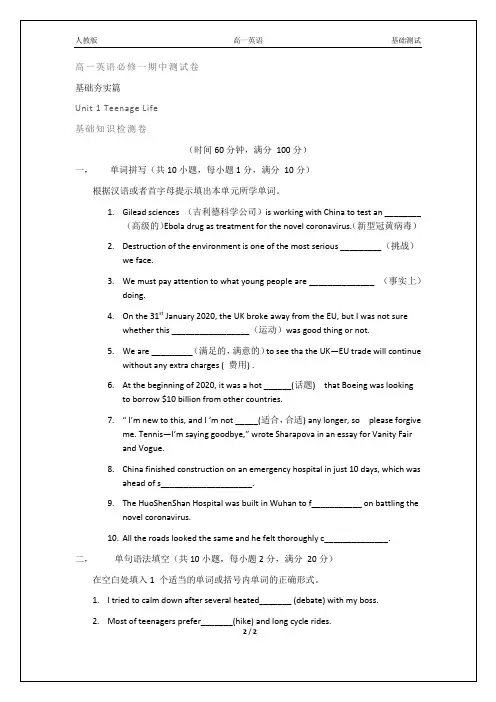
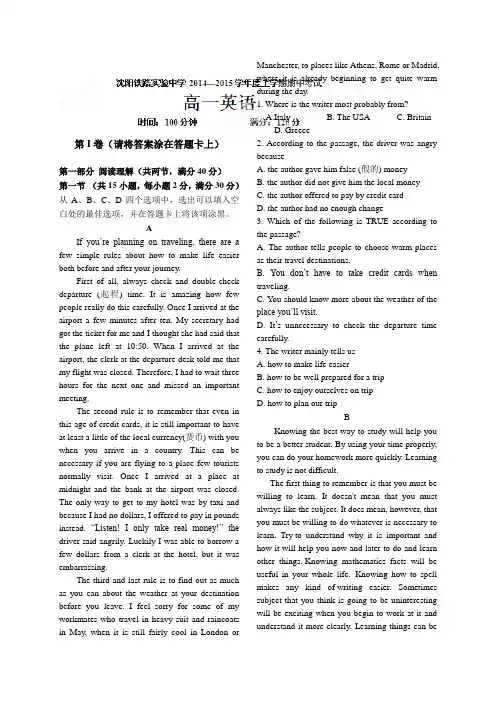
第I卷(请将答案涂在答题卡上) 第一部分 阅读理解(共两节,满分40分) 第一节 (共15小题,每小题2分,满分30分) 从A、B、C、D四个选项中,选出可以填入空白处的最佳选项,并在答题卡上将该项涂黑。 A If you’re planning on traveling, there are a few simple rules about how to make life easier both before and after your journey. First of all, always check and double-check departure (起程) time. It is amazing how few people really do this carefully. Once I arrived at the airport a few minutes after ten. My secretary had got the ticket for me and I thought she had said that the plane left at 10:50. When I arrived at the airport, the clerk at the departure desk told me that my flight was closed. Therefore, I had to wait three hours for the next one and missed an important meeting. The second rule is to remember that even in this age of credit cards, it is still important to have at least a little of the local currency(货币) with you when you arrive in a country. This can be necessary if you are flying to a place few tourists normally visit. Once I arrived at a place at midnight and the bank at the airport was closed. The only way to get to my hotel was by taxi and because I had no dollars, I offered to pay in pounds instead. “Listen! I only take real money!” the driver said angrily. Luckily I was able to borrow a few dollars from a clerk at the hotel, but it was embarrassing. The third and last rule is to find out as much as you can about the weather at your destination before you leave. I feel sorry for some of my workmates who travel in heavy suit and raincoats in May, when it is still fairly cool in London or
2016---2017学年度高一上学期英语期中考试题说明:本套试卷分第Ⅰ卷和第Ⅱ卷两部分,满分150分。
考试时间:90分钟。
第I卷第一部分阅读理解(共20题;每小题2分,满分40分)AThe First Time I Sold A PaintingThe first time I sold a painting was during an art fair(艺术博览会). I was satisfied with all the people who stepped at my booth(摊位),only to leave without buying anything .One couple, however, kept returning to admire a particular painting, and they finally decided to buy it.My first sale! Someone did like my work. Then, as they walked away, I heard the woman say, “Won't Grandma's wedding(婚礼)portrait(肖像) look wonderful in this frame(框)?”1. No one would buy his paintings because his paintings were ______.A. good-looking but no useB. so expensive that no one could afford toC. not good enough to be worth buyingD. very cheap but wonderful2. The couple bought the painting ______.A. and were going to put it beside their grandma's wedding portraitB. and were going to put it in the frame in place of their grandma's portraitC. and then, took the painting away from the frame and put their grandma's portrait inD. that looked exactly the same as their grandma's wedding portrait3. From the passage, we can see that ______ .A. all his paintings were set in frames on saleB. all the paintings looked wonderfulC. nobody bought a paintingD. no one was attracted by the beautiful paintingsBOnce there was an old man in a town. He always forgot a lot of things. So his wife always had to say to him, “Don’t forget this!”One day he went on a long trip alone. Before he left home, his wife said, “Now you haveall these things. They are what you need for your trip. Take care of your things during the trip.” He went to the station, bought a ticket and got on the train with it.About half an hour later, the conductor(检票员)began to see the tickets. He came to the old man and said, “Will you please show me your ticket?” The old man looked for his ticket in all his pockets, but he could not find it. He was very worried. “I can’t find my ticket.I really bought a ticket before I got on the train.” said the old man.“I believe you bought a ticket. All right, you don’t have to buy another one,” said the conductor kindly. “But how can I know where I’m going? –I can’t remember my station!” the old man said sadly.4.The old man in the story was very ______.A. kindB. poorC. forgetfulD. sad5.Where is the ticket? _______A. The old man forgot to buy it.B. The old man could not remember where it was.C. The old man showed it to the conductor.D. The old man’s wife took the t icket away.6. The old man bought the ticket _____ he got on the train.A. afterB. beforeC. asD. when7.The conductor ______ the old man.A. didn’t believeB. laughed atC. believedD. felt sorry8. The old man was sad because _______.A. he had to buy another ticket.B. he lost all the things his wife gave him.C. he did not know where he was.D .he did not know where he should get off.COn television all over the world,there are programs(节目)about the work of the police. They are popular because they are usually very exciting. In London, there is a television program called “Police Five”—because it is on for five minutes once a week. A television reporter, Shaw Taylor, talks about crimes(罪行) in the London area. He asks forpublic help. The police station needs the help of ordinary people because sometimes you or I have information that can be useful to the police.Shaw Taylor shows pictures of paintings, jewelry(珠宝)and other things which thieves (小偷)stole(偷窃)during the week. Sometimes he shows the car that the thieves escaped in. When people see men or things on the television program which they may remember, they can tell the police where they saw them. With their help, the police may catch more criminals.(罪犯)Sometimes the police find a car or some money. Shaw Taylor shows them on television. The owners sometimes see them. Then they can telephone the police and say, “Thank you very much—that's mine!”9. The television program is called “Police Five”, because it is about the work of the police and ______ .A. it is on for five times every weekday.B. it lasts five minutes a weekC. it begins at five in the afternoonD. it is program about five policemen10. From the passage we know Shaw Taylor is ______.A. a popular TV reporterB. a TV reporter few people knowC. a TV reporter ordinary people don't likeD. an unknown TV reporter11. The police station asked for public help because ______.A. ordinary people like the television programB. ordinary people are interested in picture of paintings, jewelry etc.C. The policemen can not catch the thieves themselvesD. ordinary people may help the policemen get useful information about the criminals12. The program helps a lot in ______ .A. helping the police find the criminals and giving the things back to the ownersB. exciting ordinary peopleC. making the police popularD. frightening the thievesDMrs. White lived in a town of England. Her husband died three years ago and one of her children worked in the capital and the other three lived in another town. Her husband didn’tleave her much money and she had to live a simple (简朴) life. Sometimes her children went to see her during their holidays, but they stayed with her for only two or three days.One winter morning the old woman got up early. She was going to buy some food in a shop. And when she came out, she found there was much snow in the street. She had to sweep (清扫)it away. And suddenly she found a dying dog at the corner of the house. She picked it up and took it into the house quickly. She put it near the fire and gave it some milk and bread. At first the poor dog ate nothing and that afternoon it drank some milk and three days later it was all right. Now the old woman found it was a beautiful dog. And she liked it very much and took it everywhere she went. A week later she went shopping with her dog. At a bus stop a young man was eating fish and chips. The little dog became very excited at the smell of the man’s lunch and be gan jumping up at him.“Do you mind if I throw it a bit (一点)?” asked the young man.“Not at all,” answered Mrs. White.Having heard this, he picked up the dog and threw it over the wall.13. One of the old woman’s children worked in ______.A. MoscowB. ParisC. LondonD. New York14. Mrs. White lived a simple life because ______.A. she wasn’t rich enoughB. she hoped to save money for her childrenC. she had four childrenD. her children hated her15. It was _______ that morning when Mrs. White went to buy something.A. rainyB. snowyC. windyD. cloudy七选五(共5小题,每小题2分,满分10分)根据短文内容,从短文后的选项中选出能填入空白处的最佳选项。